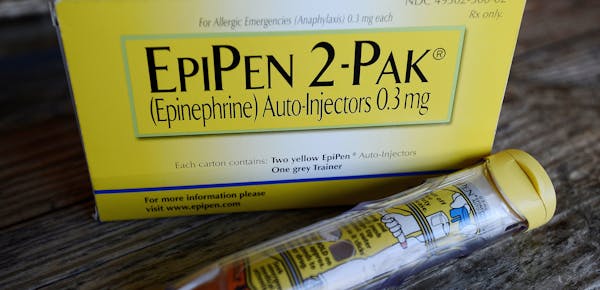Minnesota Attorney General Lori Swanson has joined the growing line of elected officials looking into huge price hikes for the EpiPen injector used by people with life-threatening allergies.
In a letter this week to Mylan pharmaceuticals, Swanson cited federal and state antitrust laws as the authority behind her demand for the company's pricing and sales data since 2007 — including its sales to Minnesota schools — and asked that the information be turned over by Sept. 20 together with a sworn statement attesting to its validity.
Swanson said in an interview Friday that the price for EpiPen's injectable epinephrine product shot up from just over $50 in 2007, when Mylan bought the company that produced it, to more than $650 in recent months. She noted that Mylan has nearly 90 percent of the market, giving it an effective monopoly.
"When you look at the price spike of this drug it's just extraordinary," Swanson said. "I mean, it costs just a couple bucks to produce it."
Swanson's letter comes on the heels of a letter signed by Sen. Amy Klobuchar, D-Minn.; Sen. Charles Grassley, R-Iowa, and Sen. Richard Blumenthal, D-Conn., questioning Mylan's marketing practices for the EpiPen. Klobuchar said she was notified by the Centers for Medicare and Medicaid Services (CMS) that the company misclassified the EpiPen as a "non-innovator" drug, which is comparable to a generic classification, a practice that resulted in lower discounts from Mylan to the states.
"The Minnesota Department of Human Services has estimated that this misclassification will cost our state more than $4 million in overpayment this year alone," Klobuchar said. "This egregious action warrants an immediate and thorough nationwide investigation by the Centers for Medicare and Medicaid Services into the overpayments by all states."
Mylan said in a prepared statement that it had complied with all Medicaid rules and federal laws.
Swanson said her office weighed in because it has authority to enforce the state's antitrust laws. Because Mylan has monopoly control of the market, she said, it can't engage in anticompetitive conduct.
"And so our inquisition is to get at what is Mylan doing here? Are they engaging in conduct that's designed not just to make a profit for themselves but also to actually injure or harm competition?"
Swanson noted that Mylan's contract with a Virginia school district requires that it certify that it won't purchase any of EpiPen's competitor products for a year. She said her office is trying to find out from Mylan if it has similar clauses in contracts with any Minnesota school districts or other institutional purchasers, such as prisons and universities.
Statnews.com reported Aug. 25 that Mylan sold EpiPens at a discount to school districts on the condition that they not buy similar products made by competitors. Mylan responded that it had abandoned the prohibition, but wouldn't say when.
Swanson said Mylan has not yet responded to her letter, which is dated Aug. 31.
No public institutions in Minnesota have complained about Mylan's contracts, Swanson said, but many consumers have called to say they can no longer afford the EpiPen.
Staff writer Jim Spencer contributed to this report.
Dan Browning • 612-673-4493

Minnesota State Patrol celebrates diverse new class of troopers

Fired Mpls. teacher accuses management of 'cancerous rot'

Jill Biden rallies women, teachers for the Biden-Harris ticket in Bloomington speeches
Neighbors, city officials at odds over Rochester lake dam

